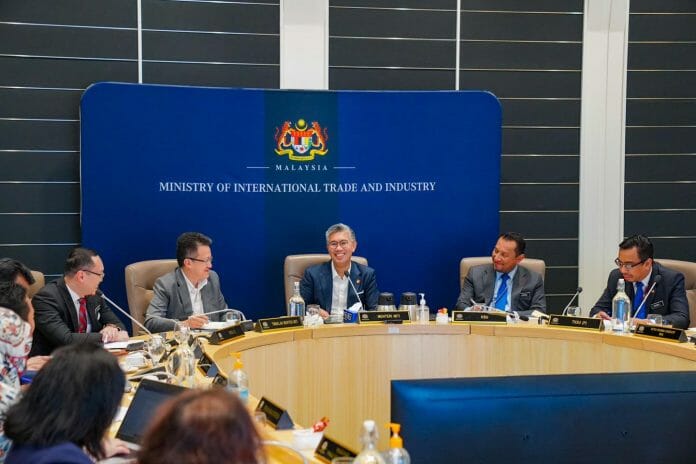Rumbling of Malaysia quitting the Comprehensive and Progressive Agreement for Trans-Pacific Partnership (CPTPP) after new Minister Datuk Seri Tengku Zafrul took office at the Ministry of International Trade and Industry can now be laid to rest, as the Ministry says it will stand firm and is prepared to assist and support Malaysian industries, exporters, and the rakyat reap the numerous benefits of the agreement which has come into effect on 29 November 2022 for Malaysia.
The CPTPP’s comprehensive scope includes traditional market access areas as well as factors such as Labour, Environment, State-Owned Enterprise, Government Procurement, Intellectual Property, Electronic Commerce, and Small and Medium Enterprises (SMEs). Malaysia will benefit from preferential duty rates for goods that are exported to and imported from the eight (8) CPTPP member countries that have implemented this Agreement i.e., Australia, Canada, Japan, Mexico, New Zealand, Peru, Singapore and Viet Nam.
Preferential duty rates that take effect immediately include:
a) Full duty-free treatment to all Malaysian exports entering Singapore and Australia.
b) Duty-free treatment on 96% of our exports and tariff lines to New Zealand presently, which is set to increase to 100% by 2024. Notably, Malaysian products across all sectors can enter the New Zealand market at zero duty, except for products such as textiles and processed wood which will become duty-free by 2024.
c) Malaysian exports to Japan are subject to duty-free treatment for 86% of tariff lines, which will increase to 100% by 2038.
d) Duty-free treatment for 88% of Malaysian tariff lines to Viet Nam, set to be at 100% by 2033.
With the implementation of the CPTPP, MITI says Malaysian exporters will benefit from duty-free treatment for the majority of tariff lines to three new markets, i.e., Canada, Mexico and Peru, with whom Malaysia did not have any prior FTA. Canada will progressively eliminate duties on the remaining tariff lines by 2029, while Mexico and Peru by 2033.
Notably, samples of Malaysian exports that clearly stand to benefit from zero duty include:
a) Automotive parts and components, textiles, and footwear for the Mexican market.
b) Cocoa-based products, rubber products, palm oil, and plastics for the Peruvian market.
To enjoy the CPTPP preferential tariffs, eh Ministry advises exporters and producers that they must obtain the Certificate of Origin (CO) issued by MITI. To qualify for the CO, Malaysian exporters to CPTPP countries are required to comply with the corresponding Rules of Origin (ROO) requirements. Inputs and raw materials sourced from all CPTPP countries are recognised as originating content, thereby enabling companies to tap into diverse, more efficient and cost-effective regional supply chains. In facilitating ROO compliance, the Agreement also presents exporters with multiple choices of Regional Value Content (RVC) calculation methods.
As for benefits for importers, industries, and Malaysians in general, key benefits include:
a) Improved access to a wider range of competitively-priced raw materials and intermediate goods from CPTPP countries, which feed into finished products that are either exported or sold domestically. As such, the rakyat, as consumers, will also be able to enjoy quality products at competitive prices.
b) Facilitation of capital flows into the country, which in turn will create quality and high-skilled jobs as well as economic opportunities for Malaysians.
c) Better investment ecosystem through capacity-building which will enhance Malaysia’s attractiveness as an investment destination.
d) Improved protection, predictability, and transparency for Malaysians to invest in CPTPP countries.
e) Malaysian professionals’ ability to export their services through mutual recognition of professional qualifications, licensing or registration, through the Guidelines for Mutual Recognition Agreements (MRA) or Arrangement for Professional Services.
f) Better facilitation of cross-border movement of appropriately qualified professionals in several service-based sectors that are of key interest to Malaysia, such as accounting, engineering, architectural, legal, medical, and dental services.
In particular, the facilitation mechanisms offered by the CPTPP, will effectively reduce barriers encountered by business professionals at the borders of CPTPP countries. This will facilitate business travel or relocation on a temporary basis for specific categories of professionals involved in trade and investment activities.
Equally important are the technical assistance and capacity-building programmes incorporated in the Agreement, which will help develop local capabilities in sectors such as automotive, E&E, chemicals, optical and scientific equipment as well as medical devices.
As a full Party to the Agreement, Malaysia is now able to participate effectively in the ongoing accession negotiations with the United Kingdom. In addition, given the imminent accession by China, Chinese Taipei, Ecuador, Costa Rica, and Uruguay, Malaysia has the right to participate in accession talks with these countries to obtain maximum benefits for the country.
All agencies within MITI’s ecosystem are also ready and well-equipped to assist Malaysian exporters, producers; investors and services suppliers; business communities and professionals; as well as SMEs to harness the full potential and benefits of the CPTPP.









